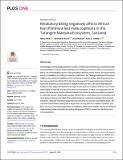| dc.contributor.author | Felix, Nancy | |
| dc.contributor.author | Kissui, Bernard | |
| dc.contributor.author | Munishi, Linus | |
| dc.contributor.author | Treydte, Anna | |
| dc.date.accessioned | 2023-10-04T11:32:47Z | |
| dc.date.available | 2023-10-04T11:32:47Z | |
| dc.date.issued | 2022-08-31 | |
| dc.identifier.uri | https://doi.org/10.1371/journal.pone.0272272 | |
| dc.identifier.uri | https://dspace.nm-aist.ac.tz/handle/20.500.12479/2113 | |
| dc.description | This research article was published in the PLOS ONE in 2023 | en_US |
| dc.description.abstract | In landscapes where people and lions coexist, conflicts are common due to livestock preda-
tion and threats to human safety. Retaliatory lion killing by humans is often a consequence
and is one of the leading causes of lion population declines across Africa. We assessed the
effects of retaliatory lion killing on male lion coalitions in the Tarangire-Manyara Ecosystem
(TME) using a long-term dataset of lion monitoring for ten lion prides, spanning over a four-
teen year-period from 2004–2018. We also interviewed 214 respondents about their atti-
tudes and awareness of the effects of retaliatory killing on lions. We found that male lion
coalitions were larger and lasted for a longer tenure period in locations with low risk of retal-
iatory killing, as well as far away from active hunting blocks. Further, young people (18–35
years old) had a more positive attitude towards lion existence and conservation compared
to older age classes. Surprisingly, people with primary or secondary level of education were
more likely to having lions killed if they attack livestock compared to people with no formal
education, although the former supported lion presence for tourism in protected areas. We
conclude that retaliatory killing has a large effect on long-term lion coalition dynamics and,
thus, survival. Community awareness on retaliation effect varies widely, and we recommend
implementing better education and policy strategies at TME to protect the declining carni-
vore populations. | en_US |
| dc.language.iso | en | en_US |
| dc.publisher | PLOS ONE | en_US |
| dc.subject | Research Subject Categories::NATURAL SCIENCES | en_US |
| dc.title | Retaliatory killing negatively affects African lion (Panthera leo) male coalitions in the Tarangire-Manyara Ecosystem, Tanzania | en_US |
| dc.type | Article | en_US |

